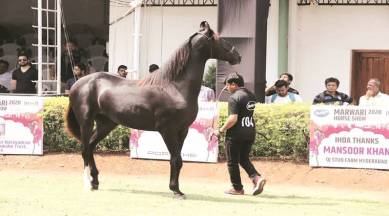Stay updated with the latest - Click here to follow us on Instagram
Punjab vet varsity cautions horse owners against on-going possible outbreak of equine herpes virus in state
The unusual thing about the outbreak is presence of only nervous signs and absence of any respiratory form or abortion in pregnant mares as described in herpes infections literature.

Guru Angad Dev Veterinary and Animal Sciences University, Ludhiana has cautioned horse rearing farmers against on-going possible outbreak of equine herpes virus disease in Punjab.
The varsity said that in the past two months, many cases of horses have been reported at the university hospital for the complaint of this disease. The disease is present in almost all the parts of the state with most of the cases being reported from Malwa region of Bathinda, Faridkot, Sri Mukatsar Sahib, Mansa and Moga, which is the major equine rearing belt of the state.
monthly limit of free stories.
with an Express account.
The unusual thing about the outbreak is presence of only nervous signs and absence of any respiratory form or abortion in pregnant mares as described in herpes infections literature. A large number of horses belonging to police, ITBP, BSF and other paramilitary & military forces in north India are at risk of the disease and hence should be vaccinated against this disease. The information was shared by Dr. Ashwani Kumar, HoD, Veterinary Medicine.
He discussed symptoms and said that there may be sudden onset of hind quarter paresis of various degrees. Animals show inability/difficulty to get up. Animal faces Ataxia or staggering of gait due to hind quarter weakness. Recumbency is noticed in some horses. Progression of signs leads to coma or death. Appetite remains almost normal. Initially it affects one or two horses in the herd.
Dr Kumar while informing about the management of sick horses, said that owners should provide them good footing such as grass, sand, rice or wheat husk to affected horses. Place food & water in an accessible location at a convenient height above ground level and remove obstacles in the stables. Maintain recumbent animals in sternal position & roll every 2-4 hours to reduce the risk of myonecrosis and decubital ulcers. Whenever possible lift and support the horse in standing position using an appropriately fitting sling.
He suggested reducing spread by infectious aerosols, direct contact and fomites. Isolate affected animals immediately in well ventilated space from the rest of the herd. Minimise traffic of horses and human beings on premises. Separate caretakers to handle affected and unaffected horses. Clean/disinfect stalls by iodophors or phenolic products and leave empty for several weeks. Dispose of aborted foetus and materials if any by burning. Suspend covering in affected breeding farms. Suspend taking horses to any show, melas, mandis or races for at least two months or till the outbreak subsides.
He said to vaccinate all the unexposed horses/mares immediately. Give booster doses to all vaccinated pregnant mares. Vaccinate young foals for the first time at 9 months, with a booster dose after 4 week and 6 months. Vaccinate adult horses initially with two doses 3-4 weeks apart & then annually.